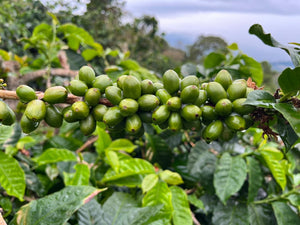The Low-Caffeine Option, A Growing Appeal
Nov 05, 2024
Laurina Coffee Plant: A Deep Dive into Its Unique Qualities
The coffee industry is teeming with diverse varieties, each contributing distinctive characteristics to the world’s beloved cup. Among these varieties, Laurina stands out not only for its rich history but also for its unique chemical composition—most notably, its low caffeine content. This natural mutation has generated significant interest in recent years, particularly as consumers become more health-conscious and demand alternative options. In this text, we will explore the Laurina coffee plant, its low caffeine quality, and compare its benefits to traditional decaffeinated coffee, highlighting why Laurina may represent the future of specialty coffee.
Origins and Characteristics of the Laurina Coffee Plant
The Laurina coffee plant, also known as **Coffea arabica var. Laurina**, is a variety of Arabica coffee with a mutation that causes it to produce significantly less caffeine than typical Arabica cultivars. Its roots can be traced back to the island of Réunion (formerly Bourbon), a French territory located in the Indian Ocean. The Laurina variety is sometimes referred to as **"Bourbon Pointu"** because of its geographical origin and its pointed shape, but its genetic mutation remains its defining trait.
The Laurina coffee tree is recognized for its small, round leaves and compact growth, which make it particularly well-suited for cultivation in high-altitude regions, where the cooler climate can accentuate the plant’s delicate qualities. The beans themselves are also small, and their flavor profile is delicate, often described as sweet, floral, and subtly fruity. The unique characteristics of Laurina coffee are part of what makes it so sought after, especially in high-end specialty markets where consumers appreciate a nuanced and less conventional cup of coffee.
Low Caffeine Content: A Defining Feature
The hallmark of Laurina coffee is its significantly lower caffeine content when compared to other Arabica varieties. In a standard Arabica bean, caffeine content typically ranges from 1.2% to 1.5%. In contrast, Laurina beans contain approximately 0.8% caffeine, making them a mild alternative for coffee drinkers who are sensitive to caffeine’s stimulating effects. This lower caffeine concentration is a result of a natural genetic mutation, and it makes Laurina an appealing option for those looking to enjoy the rich flavors of coffee without the usual side effects of higher caffeine levels, such as jitteriness, anxiety, or disrupted sleep patterns.
Caffeine, though an essential component of coffee, is also a natural stimulant that can have significant physiological effects. The amount of caffeine in a cup of coffee varies depending on the brewing method, but for many individuals, the high caffeine content of traditional coffee is not ideal. Laurina, with its reduced caffeine content, offers a gentler experience while still providing the complex flavors that coffee enthusiasts crave.
Comparison: Laurina vs. Decaffeinated Coffee
To understand the benefits of Laurina coffee, it is important to compare it not just with regular coffee but also with decaffeinated coffee. Decaf coffee, which is created through various processes like solvent-based decaffeination, water processing, or CO2 extraction, typically results in beans that have 97% of their caffeine removed. While decaffeinated coffee offers a lower-caffeine alternative, it also often sacrifices some of the complex flavor notes found in a fully caffeinated brew. Additionally, the decaffeination process can introduce chemical residues or alter the flavor profile in ways that are less desirable for connoisseurs.
Laurina coffee, on the other hand, presents a naturally low-caffeine option, which means it retains more of the natural flavors of the coffee bean compared to decaf varieties. The process of achieving a lower caffeine content in Laurina is genetic and not mechanical, preserving its original taste and aromatic properties. This makes Laurina a preferred choice for those who want to avoid high caffeine intake but still wish to experience a coffee with depth, richness, and complexity. For example, Laurina beans tend to have floral, citrus, and fruity notes, making them a versatile choice for different brewing methods, including espresso, pour-over, and French press.
Key Differences:
- Caffeine Content:
- Laurina: Approximately 0.8% caffeine.
- Decaffeinated Coffee: Contains trace amounts of caffeine, usually 0.1% or less.
- Regular Arabica Coffee: Typically around 1.2% to 1.5% caffeine.
While Laurina offers a mild caffeine experience, decaffeinated coffee contains even less caffeine, though often not zero. For people who are extremely sensitive to caffeine, decaf might still be a better option, but for those who are only mildly sensitive, Laurina provides a middle ground.
- Flavor Profile:
- Laurina: Known for its refined, subtle flavors with sweet, floral, and fruity notes.
- Decaffeinated Coffee: Often described as flat or lacking in depth due to the decaffeination process.
- Regular Coffee: Rich and robust, with a wide range of flavor profiles depending on the region and processing method.
Laurina’s flavor is a defining feature. While decaffeinated coffee can sometimes taste dull or overly bitter due to the decaffeination process, Laurina retains the full spectrum of flavor typical of Arabica beans, offering a smoother, gentler coffee experience.
- Health Implications:
- Laurina: Lower caffeine content can reduce the risk of caffeine-related side effects like insomnia, anxiety, and digestive issues.
- Decaffeinated Coffee: Still provides some caffeine, but may also contain trace chemicals from the decaffeination process, which may not appeal to those looking for a fully natural beverage.
- Regular Coffee: Can cause jitteriness, increased heart rate, or digestive discomfort in some people, especially when consumed in large quantities.
Laurina offers a more naturally caffeine-reduced option, whereas decaf is processed to remove most of the caffeine, which can sometimes affect the integrity of the coffee.
The Growing Appeal of Low-Caffeine Coffee
There has been a notable shift in consumer preferences towards beverages that are not just low in caffeine but also high in quality. Coffee drinkers are increasingly aware of the health implications of high caffeine consumption, with concerns over sleep disturbances, anxiety, and heart health being front and center. The popularity of “low-caf” coffee, or coffee that has reduced caffeine levels while maintaining flavor, has created a niche market, and Laurina is at the forefront of this trend.
Furthermore, Laurina's more delicate flavor profile appeals to specialty coffee drinkers who are looking for new and exciting coffee varieties. Its gentle stimulation is ideal for individuals who enjoy coffee as a ritual without the harsh impact of a regular high-caffeine cup. Whether consumed at breakfast, during the afternoon, or as an evening treat, Laurina offers a smooth experience that suits the modern coffee drinker’s lifestyle.
The Laurina coffee variety represents an exciting development in the world of specialty coffee, offering a low-caffeine alternative that doesn’t sacrifice flavor. Its natural mutation provides a gentler cup of coffee, making it an attractive option for those seeking a milder stimulant without the extreme reduction in flavor often associated with decaffeinated beans. By maintaining much of the inherent complexity of Arabica coffee, Laurina strikes a balance between flavor and caffeine content, ensuring that coffee drinkers can enjoy a satisfying cup without the harsh side effects of traditional coffee.
For those who love coffee but are sensitive to caffeine, Laurina offers a nuanced and full-flavored solution that avoids the drawbacks of decaffeinated coffee. With its smooth, aromatic profile and low caffeine content, Laurina could be the future of coffee, offering both connoisseurs and casual drinkers a healthier and more refined alternative to the conventional coffee experience.

